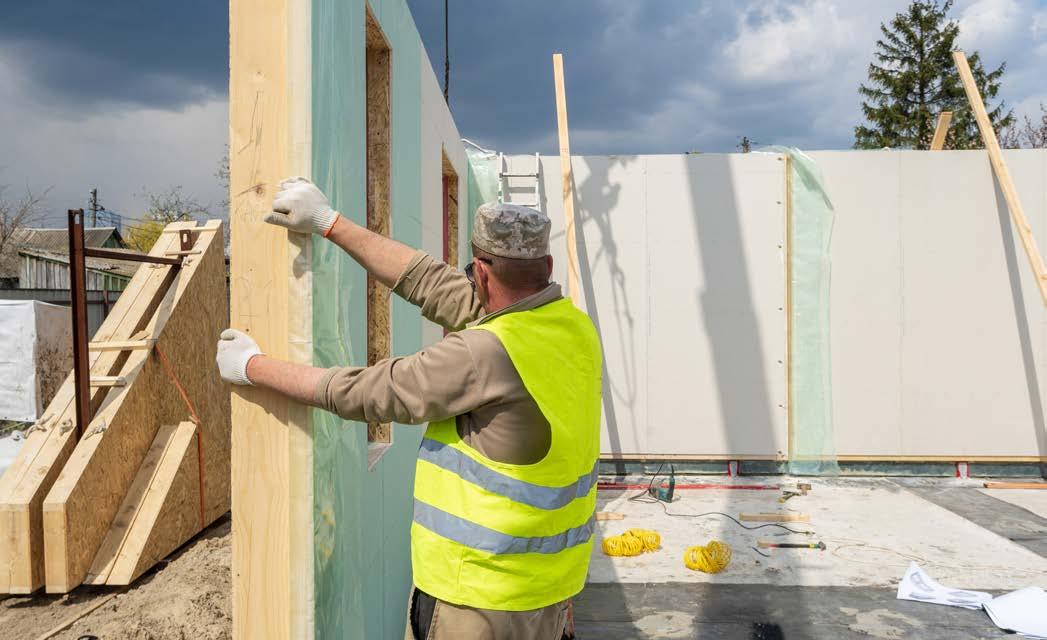
15 minute read
Green Living with IGBC (and more
Everyone has a part to play in reducing greenhouse gas emissions points out the Society of Chartered Surveyors Ireland. SCSI issued a list of Ten Tips for making homes more energy efficient and sustainable.
Taking steps towards energy efficient homes
Advertisement
The Society of Chartered Surveyors Ireland (SCSI) has pointed out that governments on their own cannot solve our climate crisis.
Emissions In 2018 it was estimated the Irish built environment accounted for 35% of all greenhouse gas emissions.
So, this shows the importance of making our homes, our places of work, our schools and hospitals as energy efficient and sustainable as possible.
Krystyna Rawicz a leading member of the SCSI’s Sustainability Group stresses that everyone has a part to play in helping Ireland meet its climate action targets.
To further encourage this, the SCSI issued ten top tips for making homes more energy efficient.
Planning: It’s really important to plan your home upgrades and to get professional advice to ensure that any proposed upgrades are successful.
Not all work has to take place in one go, and for some homeowners, a deep retrofit will be appropriate. For others, works can take place over a number of years.
All homeowners should keep a record of any such works undertaken, including product data sheets, contractor’s invoices etc.
These can be added to a Renovation Passport for the home in future years. Building Fabric: Up to 40% of a home’s heating energy can be lost and up to 87% gained through glazing.
Selecting the right type and size of glazing systems is vital to maximise energy efficiency.
Insulation is essential to keep your home warm in winter, while it can also help with weather proofing and soundproofing.
Depending on the type of home, it can be placed inside or outside external walls, in cavities as well as in the attic or at roof level.
When upgrading insulation it’s essential to think about potential condensation risks and professional assistance is important to avoid cold bridging Air leakage: Air leakage for example around poorly fitting windows and doors, accounts for 15-25% of heat loss in buildings.
Sealing your home effectively is one of the simplest upgrades you can undertake.
Lighting: Consumes 8-15% of the average household electricity budget. Efficient
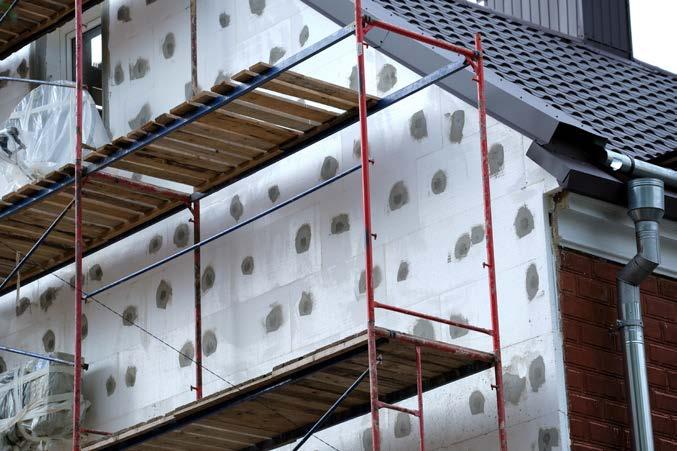
and well-designed lighting can make for significant energy savings.
Design your home to maximise the use of daylight and use energy-efficient lighting such as LED.
Solar panels: Is your home suitable for the installation of solar PV (photovoltaic) panels? The siting, orientation and tilt of modules are all critical to gain maximum efficiency.
As we move towards electrification of our entire economy, including home heating systems, producing a proportion of your electrical use from your own rooftop is highly rewarding.
Heat pumps: Is your home suitable for a heat pump? Heat pumps convert energy from air, water and the ground outside into heat you can use inside.
They work best in well-insulated homes with good air tightness.
Grants: Grants are available from SEAI (Sustainable Energy Authority of Ireland) for various energy efficiency measures.
For deep retrofit, the Communities Energy Grant Scheme or the National Housing Retrofit Scheme can provide grant funding, and there are special provisions for energy poor households with grants of up to 80% available. More information at www.seai.ie
Be ‘Smart’: Smart meters are the next generation of digital electricity meters and will provide customers with greater access to accurate information on their energy usage, will monitor faults while also giving users greater control over their energy consumption.
For further information on how they work go to Smart Meter Upgrade (esbnetworks.ie).
Appliances and equipment in the home can now be automated or remotely controlled to turn on or off, or to adjust settings.
Homes using automation, often with integration of broadband, are called ‘smart homes’, and can improve energy efficiency markedly.
If you don’t live in a smart home ensure all appliances which are not being used are switched off at the socket.
Reducing water consumption: Do you leave the tap running while washing dishes or brushing your teeth? Could you reduce your shower time?
Changing habits while collecting/reusing rainwater and using water-saving systems are easy ways to reduce your household’s impact on the environment. For even more impact, change your fittings to water saving fittings.
Biodiversity: Hand in hand with our climate crisis, we face an existential biodiversity crisis. How can you make your home and garden more biodiversity friendly?
Can you leave areas of grass unmown? Can you leave leaves to decompose? Can you introduce small areas of refuge for insects and small mammals? Can you introduce bat boxes or bird nesting boxes?
For more ideas take a look at www.wearetheark.org .
Not all work has to take place in one go ❜
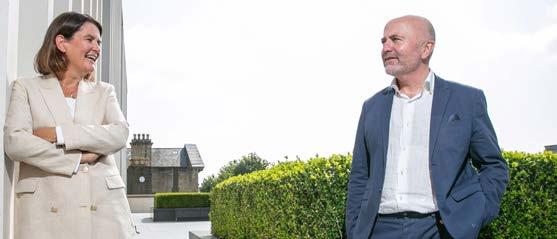
AIB and the Irish Green Building Council (IGBC) have announced a partnership to support Ireland’s transition to a more sustainable built environment through research, education and the provision of green products.
Working together The collaboration will see the two entities working together on a number of fronts. AIB is committed to ‘creating sustainable communities, and the collaboration with IGBC will see this commitment focused on the construction industry’.
This will be achieved both through developing research, education and new green loan products for the sector by sharing knowledge and education resources to further enhance the skill set of AIB staff and others within the finance and construction industries.
Buildings and construction activity account for 36% of greenhouse gases emitted, half of raw materials used, and more than 40% of solid waste produced annually in Europe.
Cathy Bryce, managing director of AIB Capital Markets, comments: ‘AIB is committed to do more to ensure a greener tomorrow by backing those building it today.
‘As well as our own operational commitments we are supporting our customers in the transition to a net zero economy across multiple sectors.
‘We are looking forward to collaborating with the IGBC in the years to come.’
Pat Barry CEO at the Irish Green Building Council says: ‘The Climate Action Act enshrines into law the objective of reaching climate neutrality by 2050.
‘To achieve this goal, sustainable, energy-efficient homes must become the new normal.
‘The scale of that challenge means private investment must be mobilised.
‘We are very excited to work with AIB, one of Ireland’s leading banks, to progress that agenda.’

Collaboration Derek O’Shea, Head of Development Finance in AIB added: ‘Collaboration is key in the transition to a net zero economy.
‘Our work with the Irish Green Building Council will support the development of more green homes, promoting biodiversity and more sustainable commercial buildings for employees.
‘The announcement comes as a growing number of investors are setting broader environmental requirements for the assets they purchase and operate.
‘Environmental, Social and Governance (ESG) analysis has become an increasingly important part of the investment process.
Define ‘The recently published European Taxonomy Regulation aims to define EU-recognised criteria for identifying sustainable activities going beyond energy efficiency.
‘These developments will impact investments in green homes in Ireland in the coming years.
‘The Irish Green Building Council has developed a national certification for quality and sustainability in new residential development that is fully aligned with the EU Sustainable Finance Taxonomy.
‘The Home Performance Index goes well beyond the Building Energy Rating (BER) and addresses all the environmental impacts of new homes and encourages home builders to improve the health and wellbeing of occupiers.’
Irish building sector leaders urge EU to prioritise decarbonising the built environment
The Irish Green Building Council and leading Irish construction companies joined a coalition of building sector leaders calling on the European Commission to support the full decarbonisation of the built environment through ambitious policies.
We reported how the group, which represents over 4,500 members across the building sector value chain, signed a letter requesting that the Commission ensure the review of key legislative files, such as the Energy Performance of Buildings directive address the total environmental impact of buildings across their full life cycle.
Cathy Bryce, managing director of AIB Capital Markets with Pat Barry CEO of IGBC
On The Record: David Calt, Regional Sales Manager at Chadwicks and Sustainability Product Advisor
David Calt is a regional manager and a key part of the sustainability offering at Chadwicks. He was the subject of our ‘On The Record’ interview for January 2022.
We asked David about his own history with the organisation and some of the changes he’d seen during his career.
David Calt
Incredible
There has been a substantial shift from traditional heating products such as oil, gas boilers and radiators to more sustainable alternatives like heat pumps, ventilation, and solar panels, David noted.
‘The landscape of available products is ever-evolving as new technologies help make the industry greener and eliminate reliance on fossil fuels.
‘As developments continue and new products emerge, it can be difficult to keep track of the solutions at your fingertips.
Help
‘To help customers with this, Chadwicks has introduced the Chadwicks ECO Centre which is currently being rolled out across branches throughout the country (at time of original writing).
‘Each Chadwicks ECO Centre showcases Ireland’s leading sustainable building materials and is complemented by a team of sustainability trained advisors who can provide guidance on the latest products and services.
Did David have any predictions for what the next big sustainability products will be?
‘Water saving controls are likely to develop more in the future as technology evolves,’ he stated.
Pat Barry, CEO of the Irish Green Building Council (IGBC) said: ‘To date, legislation and policy focus have been on tackling operational carbon. i.e. the emissions associated with the energy we use to heat and light our homes.
‘While new homes built to current building regulations should be very energy efficient, we are only addressing part of our sector’s environmental impact.
‘This open letter shows strong support from leading Irish construction companies for policies that address the environmental impact of buildings across their full life cycle.’
Leaders in housing industry establish forum to advance greener, healthier homes
Healthy Homes Ireland, a new forum established to influence public policy, recently hosted its inaugural virtual meeting to advance a greener and healthier living environment in Ireland’s homes.
Support Founded with the support of the Irish Green Building Council (IGBC) and VELUX, Healthy Homes Ireland is led by a high level steering group of fifteen notable leaders in construction, engineering, architecture, public health and the environment.
The forum will bring together a wide range of stakeholders to address the health problems caused by existing low-quality homes.
It also aims to ensure there is no compromise between health and energy efficiency in new build homes.
Importance Chair of Healthy Homes Ireland, Kevin O’Rourke, stressed the importance of the forum’s work:
‘Irish homes are estimated to be 1.9 times more likely to have dampness and 2.4 times more likely to have insufficient daylight compared to our EU counterparts.
‘Improving the energy efficiency of our homes and making them healthier must go together.
‘While decarbonising our homes is critical to reach our climate targets, health risks from poor indoor air quality, insufficient light, damp, and noise pollution must also be addressed’.
The overall impact of COVID-19, including the requirement to work from home, has further highlighted the importance of our health and living environments.
This is especially important for children as the effect of a poor living environment, not to mention the school environment, can have long-term consequences.
VELUX According to VELUX’s pre-COVID Healthy Homes Barometer research study, 1-in-4 Irish children are living in unhealthy homes.
Growing up in an unhealthy environment is associated with a higher likelihood of childhood health issues such as asthma and eczema.
Dr. Jens Christoffersen, Senior Researcher for VELUX explains: ‘We already know from our previous research that air quality, cold, damp, lack of soundproofing and insufficient daylight is an issue in Irish housing.
‘As 90% of our time is spent indoors, two-thirds of which is in our homes, we must look at ways to improve the health of our living environment.
‘We are delighted to support this forum and we are looking forward to the results of a Healthy Homes Ireland research study.

Pictured in Mountjoy Square, Dublin at the official launch of Healthy Homes Ireland, an expert forum to advance greener, healthier homes are: Marion Jammet, Head of Policy and Advocacy, Irish Green Building Council, David Gallagher, Housing Specialist, VELUX and Kevin O’Rourke, Chair of Healthy Homes Ireland. Healthy Homes Ireland (HHI) is led by a steering group of fifteen leaders in the construction, environmental and architecture sectors in Ireland and is supported by the Irish Green Building Council (IGBC) and VELUX to achieve its objectives. www.igbc.ie
‘This will shed light on potential gaps in public policy and practice that may compound this issue, and what we need to do in the years ahead to protect our health at home.’
Consider Healthy Homes Ireland will also consider aspects of the EU Energy Performance of Buildings Directive (EPBD) which requires all new builds and major renovations to meet the Nearly Zero Energy Buildings (NZEB) requirement as well as the health and well-being of building users.
Marion Jammet, Head of Policy and Advocacy, Irish Green Building Council added: ‘Healthy Homes Ireland is aligned to our overall objective to transform the Irish building industry to sustainable practices through policy creation and education.
‘All housing construction in Ireland should be well thought out and delivered to protect the health and wellbeing of the population.
‘A healthy home is not just bricks and mortar, it is also one that allows homeowners to connect to the local community and access services such as childcare and public transport.’
Meet The HHI steering group will meet quarterly and a wider forum of stakeholders with an interest in, and responsibility for, delivering better, healthier homes in Ireland will come together twice a year to fulfil the aim of HHI.
The outcomes from the work of the forum will be the presentation of evidence-based solutions to government, with an improved understanding among policymakers of what is a healthy home and how to achieve it.
For more on making homes more energy efficient and sustainable see our feature in this section.
Call for bathroom retailers to drive ‘water matters’ message
The Irish Green Building Council launched the #WaterMatters campaign, calling for bathroom retailers to communicate the importance of water efficiency to consumers.
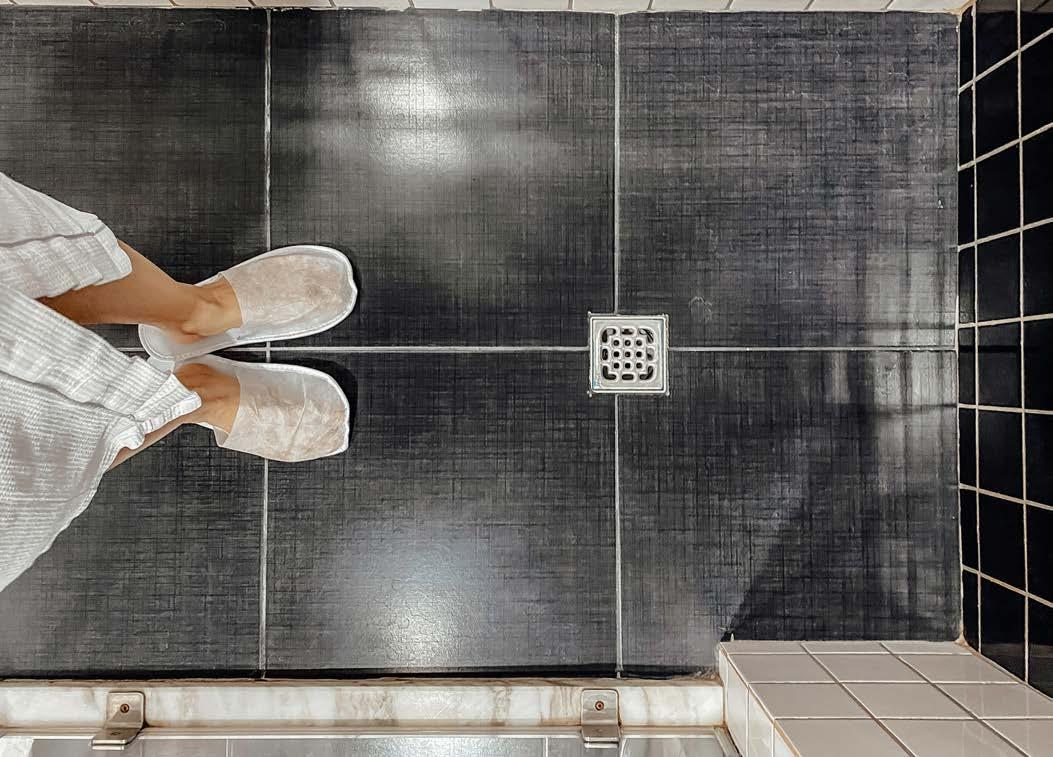
The period of the Covid pandemic has had a huge impact, not only on how much time people spend at home, but also on their views on environmental responsibility and climate change.
There is a growing interest in products that can help save water and energy, helping to keep household bills down and contributing to a more sustainable lifestyle.
We reported how a survey by the Bathroom Manufacturers Association revealed that half of those questioned would like to improve their household water efficiency (55%) but that 41% were not sure how to do so.
Help The IGBC launched the #WaterMatters campaign to help consumers know how they can reduce water use.
It calls for bathroom retailers to communicate to their clients the importance of minimising hot water usage to save energy and reduce their carbon footprint.
Pat Barry, CEO of the Irish Green Building Council said: ‘The good news for retailers is that many brands offer bathroom products carrying the Unified Water Label, an easy-to-understand label to communicate level of water usage.
Choices Austin Nevin, trading director of Chadwicks added: ‘As bathroom retailers we are well placed to take the lead and guide consumers to make more informed choices about the products they choose. ‘Chadwicks is proudly supporting the #WaterMatters campaign by beginning to display the water label on the product listings on our website. ‘We are also planning to engage with our suppliers and encourage them to sign up to the Unified Water Label.’

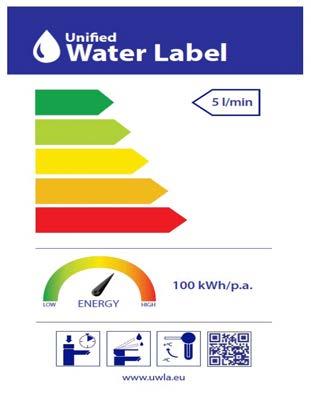
About the #WaterMatters Campaign Water Matters is a campaign calling for bathroom retailers to communicate the importance of water efficiency to consumers and create awareness on the Unified Water Label.
The industry is being asked to ‘join the campaign by training their staff to understand and communicate water efficiency, displaying the water label on their products and speaking with suppliers to ensure the products are registered with the label scheme.’ https://www.igbc.ie/water-matters/
About the Irish Green Building Council: The IGBC is Ireland’s leading authority on green building best practices with a network of over 240 organisations spanning the entire built environment industry.
The IGBC is affiliated with the World Green Building Council. This is a network of over 80 national Green Building Councils worldwide with a total membership of over 27,000 of the most progressive international organisations and businesses making it the largest organisation globally influencing the sustainable building market. www.igbc.ie.
About the Unified Water Label The Unified Water Label is a European wide initiative by companies involved in the bathroom industry.
It’s a smart tool that provides a means to identify water using products with a common label that offers clear, concise and easy to understand messaging about water energy usage. https://uwla.eu/




